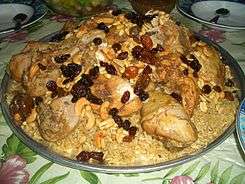Saudi Arabian cuisine
Saudi Arabian cuisine encompasses the cuisines and foods of Saudi Arabia.
Traditional cuisine
Foods and dishes

The Arabian people have consumed the same type of food for thousands of years.[1] Some of the common food items in Saudi Arabian cuisine include wheat, rice, lamb, chicken, yogurt, potatoes and dates. Shawarma and Falafel are two common dishes which are originally Levantine and Egyptian dishes respectively. These two dishes are examples of the influence of foreign residents in Saudi's food.
Additional foods and dishes include:
- Jareesh جريش
- Haneeth حنيذ
- Hininy حنيني
- Madfoon مدفون
- Mandi مندي
- Jalamah جلامة
- Gursan قرصان
- Ka'ak كعك
- Kabsa كبسة
- Khmer خمير
- Markook مرقوق
- Aseedah عصيده
- Harissah هريسة
- Mutabbaq مطبّق
- Sambusak سمبوسة
- Saleeg سليق
- Dates Mohalla محلى تمر
- Mabshoor مبشور
- Mansaf منسف
- Masgouf مسقوف
- Maqluba مقلوبة
- Manthoo منتو
- Yaghmush يغمش
- Shakshouka شكشوكة
- Roz Bukhari رز بخاري
- Dajaj Mashwi دجاج مشوي
- Kanafeh كنافة
- Muhallebi مهلبية
- Basbousa بسبوسة
- Umm Ali أم علي
Beverages
Traditional coffeehouses (Maqha) used to be ubiquitous, but are now being displaced by food-hall style cafes. According to the Saudi Arabian Cultural Mission, "serving Gahwah (Coffee) in Saudi Arabia is a sign of hospitality and generosity". Traditionally, the coffee beans were roasted, cooled and ground in front of the guests using a mortar and pestle. The host would then add cardamom pods to the coffee beans during the grinding process. Once the coffee is brewed, it is poured for guests. Today, Gahwah is not prepared in front of the guests; instead it is elegantly served in a Dallah and poured into small cups called Finjan.[1]
Drinking tea is also a popular custom in Saudi Arabia. It is used in both casual and formal meetings. The tea can be drunk black (without milk) and various herbal flavourings may be added.
Sheep, goat and camel's milk are also used by the Bedouin. Apart from the taste it has more health benefits. Milk products such as cheese, butter, yoghurt, etc. are also made from it.
Yoghurt is normally made into a drink called Laban. It may be taken either sweet mixed with Vimto or salted and smoked.[2]
Sobia is a cold drink usually made in the Hijaz but now available all over Saudi Arabia especially during Ramadan. It's made from a light fermented mixture of Barley/Brown bread, Date palm sap, Herbs and Spices. It may be either white or colored depending on the flavor. It's also found to have health benefits.[3]
Islamic dietary laws
Islamic dietary laws forbid the eating of pork and the drinking of alcoholic beverages. This law is enforced throughout Saudi Arabia. According to Islamic law, animals must be butchered in a halal way and blessed before they can be eaten. In 2008, Saudi Arabia was the world's fifth largest importer of both lamb and mutton.
According to the Saudi Arabian cultural mission, "guests are served hot coffee and dates as a symbol of generosity and hospitality. The same practice is carried out in the month of Ramadan. Muslims in Saudi Arabia break their fast with dates, water and Arabian coffee. The caffeine in the coffee and the protein and iron in dates nourishes the fasting person with a lot of energy. This helps them perform the Tarawih held in the evenings during Ramadan."[1]
See also
References
- 1 2 3 "History of food in Saudi Arabia" (PDF). Sacm.org. Retrieved 20 November 2014.
- ↑ "Smoked Laban - Ya Salam Cooking". 7 October 2011. Retrieved 28 June 2016.
- ↑ "Sobia: A thirst-quenching Ramadan drink - islam.ru". Retrieved 28 June 2016.
Further reading
- Davies, Catriona. "Saudi foodies ditch fast food for fine dining." CNN. Wednesday March 28, 2012.


